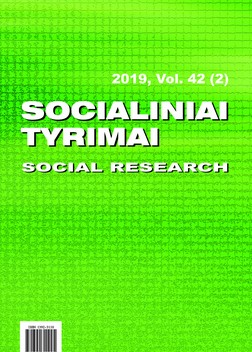Lietuvos ūkio specializacijos plėtojimo aspektai globalizacijos sąlygomis
Aspects of the Development of Lithuanian Economic Specialisation in the Context of Globalization
Author(s): Brigita Šidlauskaitė-Riazanova, Algirdas MiškinisSubject(s): Economic history, Economic development, Transformation Period (1990 - 2010), Present Times (2010 - today), EU-Accession / EU-DEvelopment, Globalization
Published by: Vilniaus Universiteto Leidykla
Keywords: regional economic specialization; regional policy;
Summary/Abstract: State resources for investment in regional development are limited, so in order to ensure the efficiency of investment it is necessary to analyse the potential of regional economic development opportunities as well as to evaluate measures that could lead to regional growth and successful implementation of regional specialization strategies. Presently there are not enough scientific studies investigating Lithuanian regional specialization development prospects in the context of the implementation of the relevant experience in foreign countries and its application possibilities in Lithuania. Therefore, this study contributes to regional economic potential detection of the regions of Lithuania. The purpose of this research is to analyse the experience of the regional policy and regional economic specialization in EU countries in order to disclose its application possibilities in Lithuania. Since the beginning of 2014–2020 EU programming period, a new approach to regional development policy has been introduced. Previously, the implementation of regional policy was subject to unified measures without considering any specific character and specialization (place-neutral approach). It is observed that such an approach is justified only in part. In many areas the differences between the EU regions have not diminished, especially in the Southern and Western European countries, where cohesion policy has been implemented for several decades. As a result, the approach to regional policy has changed and the regional development measures are now applied taking into account the specific characteristics of each region, resources and specialization characteristics (place-based approach). Lithuania, as one of the EU’s regions (NUTS2 level), has chosen a strategy of smart specialisation, which provides countrywide development prospects. A similar approach also is appropriate to apply a smaller territorial level with a view to the possible regional development sectors identified by specific characteristic, available infrastructure, business experience and economic specialization. Analysis of 2007–2015 regional economic specialization of EU regions shows that most of EU regions are not highly specialized and specialization decreased slightly during the period, indicating that change of regional specialization process is slow and changes that are more significant are possible over a long period. In addition, there is no uniform answer, whether regional specialisation should be encouraged, on what basis the priority areas could be distinguished, whereas in the context of rapid economic integration and innovation the growth of the role of comparative advantage should be seen in a more complex way. Analysis of the implementation measures experience for regional specialization leads to conclusion that setting priorities for regional economic activities (or region specialization), first of all it is appropriate to distinguish the exporting sectors with the highest gross value added and productivity in the region as well as sectors creating clusters and innovations, which are relevant to the national development priorities and with the potential to grow and compete in global markets. It is possible to set up more general larger regional economic specializations as well as sub-specializations for individual regional areas, but regional specialization should not weaken the region’s entrepreneurial flexibility and economic structure diversity. Priority should be given horizontal rather than vertical specialisation, as horizontal specialization covers all economic activities, which include innovation and high-tech applications. According to the practice of OECD countries, it is advisable at national and regional levels to support the sectors, using high technologies and innovations. In this way, regions are encouraged to move to higher value-added generating sectors and the development of technology-intensive specializations. In addition, specialization related to the desired activity rather than to the ongoing economic activity gives more favourable opportunities for the use of EU structural funds, as in EU financial perspective the assistance for innovation and technological development is assigned.
Journal: Socialiniai tyrimai
- Issue Year: 42/2019
- Issue No: 2
- Page Range: 59-73
- Page Count: 15
- Language: Lithuanian

